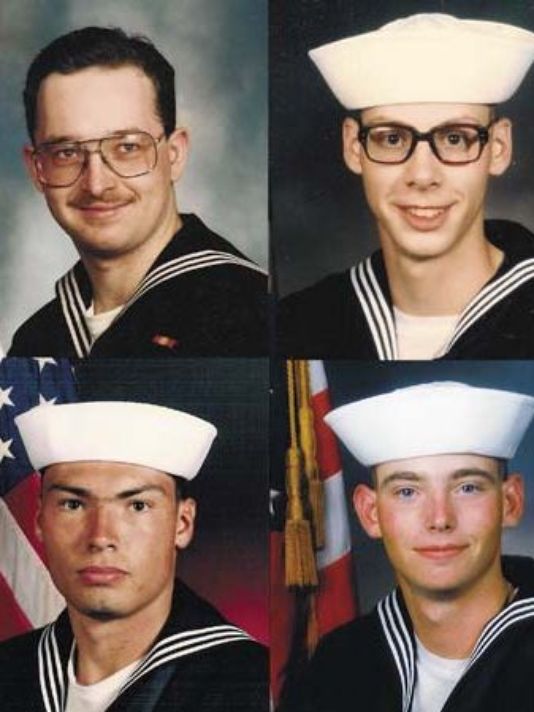False Confessions: Norfolk Four
Eighteen-year-old Michelle Bosko was raped and murdered in her apartment in Norfolk, Virginia, on July 7, 1997. Her husband, a sailor returning from duty at sea, found her body the next day.
The police investigation focused immediately on 25-year-old Danial Williams, a sailor in the U.S. Navy with no criminal record who lived in the same apartment complex with his wife and another sailor, 20-year-old Joseph Dick, Jr. The police heard that Williams had an unhealthy fixation on Michelle Bosko and interrogated him at length. Williams initially professed his innocence, but on July 9, 1997, after being told that he had flunked a polygraph examination, he confessed to Detective Robert Glenn Ford that he had committed the crime.

Despite the fact that many of the details of Williams’s confession were at odds with the crime scene, Williams was arrested and charged with the crime. At that time, the police believed that Williams acted alone. They did not see anything at the crime scene that made them believe that more than one person had been involved.
Five months later, in December 1997, the Virginia forensic laboratory revealed that sperm, blood and other genetic material from the crime scene did not match Williams’s DNA. Norfolk investigators then interrogated Dick, who initially professed his innocence. On January 12, 1998, after being told that he had flunked a polygraph examination, Dick also confessed to Detective Ford and said he had committed the crime with Williams. Dick had no criminal record and many details of his confession also varied from the crime scene and from the details of Williams’s earlier statements. Dick was arrested and charged with the capital murder and rape.
Further testing by the state laboratory revealed in March 1998 that Dick’s DNA did not match the crime scene evidence either.
The police then placed an informant in Dick’s jail cell, and the informant got information about another sailor, 21-year-old Eric Wilson. Wilson, like the other two, had no criminal record. He was interrogated and protested his innocence. However, after being told that he had flunked a polygraph examination, Wilson confessed to Detective Ford that he had acted with Williams and Dick. Many of the details of Wilson’s confession again did not match up with either the crime scene or the confessions given by William and Dick.
And once again, the crime lab determined that Wilson’s DNA did not match the crime scene evidence. The police then re-interviewed Dick who provided descriptions of former sailors whom he claimed were involved in the crime, in addition to himself, Williams and Wilson.
One of those was 27-year-old Derek Tice, a former sailor who had left the Navy and moved to Florida. Like Williams, Dick, and Wilson, Tice had no criminal record. In June 1998, Tice was brought back to Virginia and interrogated. He protested his innocence, was told that he had flunked a polygraph examination, and eventually confessed to Ford that he had committed the crime. In his confession, he named the three suspects who had already been arrested and also said that Geoffrey Farris and Richard Pauley had been involved. Farris and Pauley were both arrested and jailed for many months, but they maintained their innocence and were eventually released.
Tice’s confession, like those of the others before him, was at odds with many of the details about the crime scene and conflicted with the confessions of Williams, Dick and Wilson. As with the earlier suspects, the state forensics lab confirmed, in August 1998, more than one year after the crime, that the crime-scene DNA did not match Tice, Farris or Pauley.
In February 1999, nineteen months after the crime, a woman walked into the Norfolk Police Department with a letter written to her daughter by a prisoner named Omar Ballard. At the time of the letter, Ballard was in prison for two crimes. About two weeks before Bosko’s murder, Ballard and another man had attacked a young woman with a baseball bat at the same apartment complex where Bosko was killed. Ballard had sought refuge in Bosko’s apartment right after that attack, to hide from an angry mob of residents who tried to apprehend him. Within a few weeks after the Bosko murder, Ballard also raped and strangled a 14-year-old girl at knifepoint about one mile from Bosko’s apartment.
In the letter he wrote from prison, sent to threaten a former girlfriend, Ballard bragged that he had killed Michelle Bosko. The Norfolk police visited Ballard in prison in March 1999, but he would not discuss the crime. He did, however, provide physical evidence to compare to the crime scene evidence. That analysis revealed that his DNA matched the DNA of the blood and semen found at the crime scene.
Ford then interviewed Ballard, who quickly confessed. Ballard, however, said that he acted alone. His description of the crime scene was consistent with the known details of the crime, even though it had happened nearly two years earlier. In March of 2000, Ballard pled guilty to the crime and was sentenced to life imprisonment. Ballard avoided the death penalty by making a deal with the prosecution: he agreed to say that he committed the crime with the four sailors police had already charged. As part of a plea agreement, he was interrogated again and, for the first time, claimed that he had met Williams, Dick, Wilson and Tice in the apartment parking lot and had committed the crime with them. [National Registry of Exonerations]
Led by longtime MAIP Board member Donald Salzman of Skadden Arps and George Kendall of Squire Sanders, Williams and Tice challenged their convictions in federal court – arguing several constitutional claims, including that they were actually innocent. In spring of 2015, U.S. District Judge John Gibney held a hearing to determine whether they had made a sufficient showing of innocence to excuse procedural defaults on other claims, and in September 2016, he found that they were innocent, writing that “no sane person could find them guilty.” The opinion prompted the Commonwealth of Virginia to stop defending the conviction after more than a decade, and in October, Judge Gibney vacated their convictions, giving the Commonwealth of Virginia 60 days to decide whether to retry them.

Eric Wilson was unable to challenge his conviction in court because he completed his sentence and was not under supervision.
Finally, on March 21, 2017, Governor Terry McAuliffe granted full pardons to all four men. A statement from McAuliffe’s office said: “These pardons close the final chapter on a grave injustice that has plagued these four men for nearly 20 years.”
In many cases, innocent defendants make incriminating statements, deliver outright confessions, or plead guilty. Regardless of the age, capacity, or state of the confessor, what they often have in common is a decision—at some point during the interrogation process—that confessing will be more beneficial to them than continuing to maintain their innocence.
